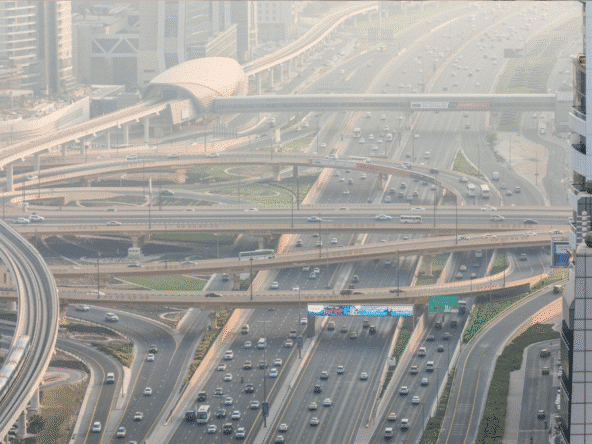Dubai, the heart of the UAE, is known for its dynamic business environment, high-end lifestyle, and cosmopolitan atmosphere. For expatriates and residents in Dubai, obtaining a visa is a significant part of living and working in the city. However, circumstances may arise where a visa in the UAE is canceled. Whether it’s due to job loss, a change in status, or a decision to leave the country, it’s crucial to understand the grace period after visa cancellation in UAE and the subsequent steps you should take. DAMAC Chelsea Residences offers a strategic location and premium living experience for those navigating such transitions in Dubai.
In this guide, we will walk you through everything you need to know about the grace period after visa cancellation in UAE, including the latest rules and regulations, what to do during the grace period, and how it can affect your stay in Dubai. Whether you hold a UAE visit visa or a UAE residence visa, it is essential to be fully aware of the procedures to avoid any legal complications.
What is the Grace Period After Visa Cancellation in the UAE?
The grace period after visa cancellation in UAE refers to the period you are allowed to remain in the country after your visa has been canceled. During this period, you are given time to arrange for your departure from the country or to regularize your status. The length of this grace period may vary depending on the type of visa you held and the circumstances surrounding the cancellation.
The grace period provides flexibility to individuals who are still figuring out their next steps, whether it is finding another job, obtaining a new visa, or preparing to leave the UAE.
Types of Visas and Their Grace Periods
Understanding the different types of visas and their associated grace periods is crucial. The grace period after visa cancellation in UAE typically depends on the type of visa UAE you hold. Let’s take a closer look at the grace periods for some of the most common types of visas:
1. UAE Residence Visa
The grace period after visa cancellation in UAE for individuals holding a UAE residence visa is generally one month. After the residence visa is canceled, you will have 30 days to either leave the UAE or apply for a new residence visa if you have secured a job or need to renew your status.
2. UAE Visit Visa
For individuals on a UAE visit visa, the grace period after cancellation is usually 10 days. It’s essential to know that if you overstay beyond the grace period, penalties may apply, which could increase your costs and complicate your future entry into the UAE.
3. Employment Visa
An employment visa cancellation in the UAE also offers a grace period, but it’s important to clarify that this can vary depending on the employer and the specific circumstances. Typically, after cancellation, a person may have anywhere from 30 to 60 days to either leave the country or apply for a new visa.
4. Investor and Partner Visa
If you hold an investor or partner visa, the grace period after cancellation might be more flexible, depending on the company’s standing, the nature of your business, and the current immigration policies.
Important Considerations During the Grace Period
After your visa cancellation in the UAE, there are several key points you need to be aware of during your grace period. Failure to comply with these can result in fines, penalties, or even a ban from reentering the UAE.
1. Avoiding Overstay Fines
One of the most important things to keep in mind during your grace period is to avoid overstaying. If you remain in the UAE beyond the designated grace period, you will incur fines, and this could affect your ability to return to the UAE in the future. It’s crucial to either leave the country or regularize your status before the end of the grace period.
2. Option to Change Visa Status
During the grace period after visa cancellation in UAE, you may have the option to change your visa status without leaving the country. For example, if you have lost your job but still wish to remain in the UAE, you might be able to apply for a UAE visit visa or another type of temporary visa while seeking new employment. It’s advisable to consult with immigration experts to explore all available options.
3. No Work During Grace Period
It’s also important to note that during the grace period, you are not allowed to work if your UAE residence visa has been canceled, unless you have obtained a new work permit or visa. Working without proper authorization during the grace period can lead to fines, deportation, and a ban from entering the UAE.
4. Exit Permit for Certain Visa Holders
If you are holding an employment visa or have been sponsored by an employer in the UAE, you will need to obtain an exit permit during the grace period if you plan to leave the country. The employer must provide this exit permit for you to depart without facing legal issues.
What Happens After the Grace Period Ends?
Once the grace period has ended, individuals who have not regularized their visa status or left the country will be considered overstayers. This could lead to the following consequences:
- Fines: The fines for overstaying vary depending on the length of the overstay. You may be fined daily, which can result in substantial costs.
- Deportation: In extreme cases, if you fail to leave after the grace period ends, you might face deportation and a ban on reentry to the UAE.
- Future Visa Complications: Overstaying your visa can complicate future visa applications to the UAE, and you may be banned from entering the country for a specific period.
How the Grace Period Affects Your Real Estate Investments
For expatriates living in the UAE, the decision to cancel a visa could have significant implications for their investments, particularly if they own luxury real estate or properties. For instance, if you own ready to move villas for sale in Dubai or other high-end properties, you’ll need to plan accordingly during the grace period.
If you have invested in properties with companies like DAMAC PROPERTIES and are considering leaving the UAE, you might need to sell or rent out your properties. Depending on the terms of your visa cancellation, you may have to take action swiftly to avoid complications. Selling or renting your luxury real estate can be a viable solution to ensure that your investments remain profitable, even after your visa is canceled.
For those seeking to buy or sell properties for sale in Dubai, it’s essential to understand the visa situation as it might impact your ability to live in the UAE post-purchase.
Final Thoughts on Grace Period After Visa Cancellation in UAE
Understanding the grace period after visa cancellation in UAE is vital for anyone who has had their visa canceled in Dubai or the broader UAE. With clear regulations on the time allowed for staying in the country after your visa is canceled, knowing the rules and adhering to them is crucial to avoid penalties and future complications. If you are in Dubai and dealing with a visa cancellation, be sure to plan ahead—whether you need to leave the country, adjust your visa status, or manage your real estate investments like those with DAMAC Properties.
Remaining compliant during the grace period is your best bet for a smooth transition, whether you’re looking to relocate, change jobs, or simply exit the UAE. Whether you own luxury real estate or are interested in exploring properties for sale in Dubai, it’s essential to navigate your visa cancellation properly to avoid any unforeseen challenges.
By staying informed about your grace period and following the rules, you can ensure that your time in the UAE remains as smooth as possible.
Related Topics
Disclaimer:
The information provided in this article is intended for general informational purposes only. The details mentioned are based on the best available information at the time of publication and are subject to change without notice by the respective authorities. Readers are encouraged to consult the relevant offices directly for the most accurate and updated information.




